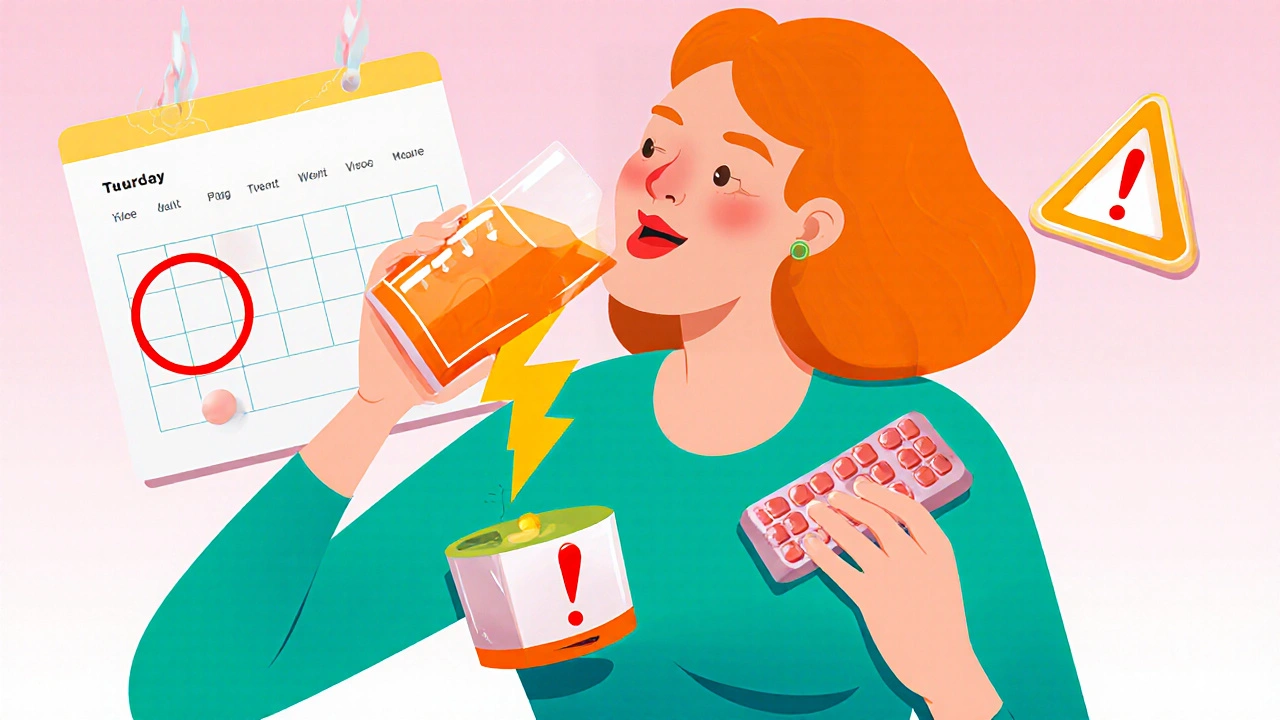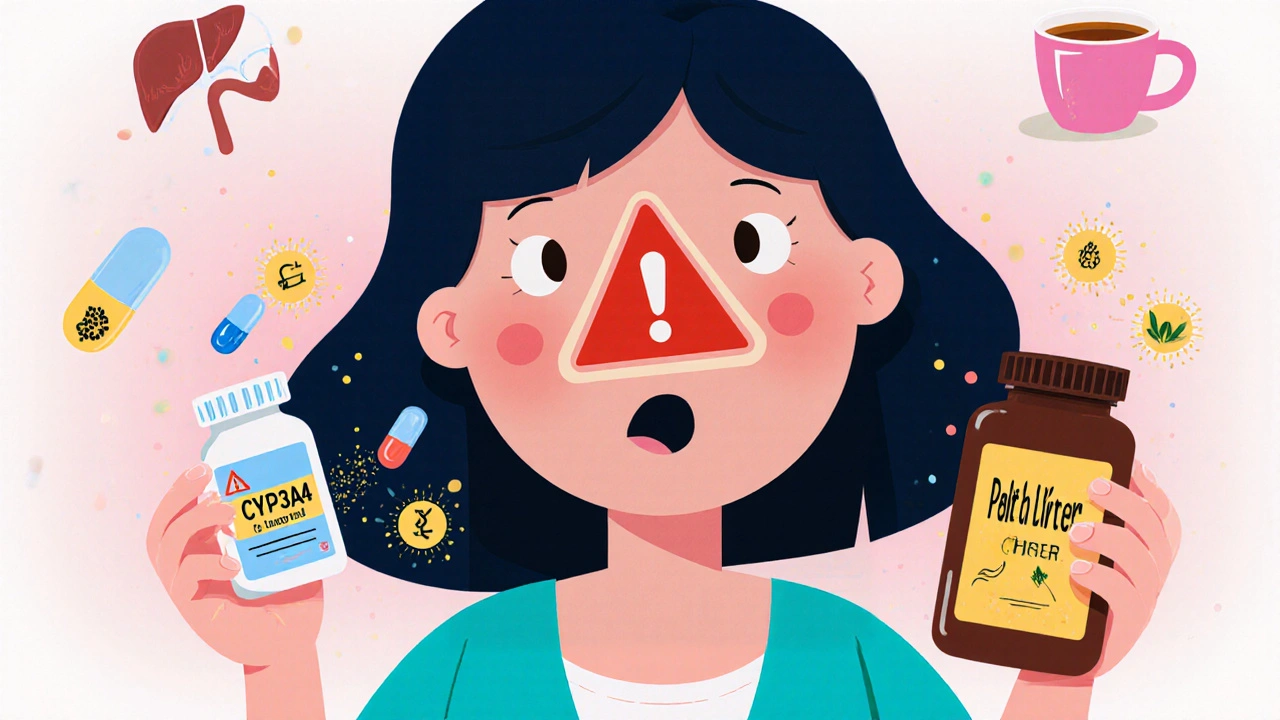Many women take herbal supplements to support energy, mood, or hormonal balance - but what if those same supplements are quietly making their birth control less effective? It’s not a myth. Some common herbs and natural products can interfere with how hormonal contraceptives work, leading to unexpected breakthrough bleeding or even pregnancy. The biggest culprit? St. John’s wort. But it’s not the only one. If you’re on birth control and taking supplements, you need to know which ones could put you at risk.
St. John’s Wort: The Most Dangerous Herbal Interaction
St. John’s wort is the most well-documented herbal supplement that reduces birth control effectiveness. It’s often taken for mild depression or anxiety, and many people assume it’s harmless because it’s natural. But here’s the problem: it triggers your liver to produce more enzymes - specifically CYP3A4 and P-glycoprotein - that break down hormones faster. That means the estrogen and progestin in your pill, patch, or ring get flushed out of your system before they can do their job.
A 2001 study found that women taking 900 mg of St. John’s wort daily along with a standard birth control pill had up to 50% lower levels of ethinyl estradiol in their blood. That’s not a small drop - it’s enough to cause ovulation. In the same study, 23% of women on both St. John’s wort and birth control experienced breakthrough bleeding, compared to just 5% of women taking birth control alone. Breakthrough bleeding isn’t just annoying - it’s a red flag that your hormones aren’t staying where they need to be.
Doctors recommend stopping St. John’s wort completely if you’re on hormonal birth control. If you can’t quit it, use a backup method - like condoms - while you’re taking it and for at least one month after you stop. The enzymes stay active in your body for weeks, so timing matters.
Soy, DIM, and Other Estrogen-Interfering Supplements
Not all interactions work the same way. Some herbs don’t speed up hormone breakdown - they compete with them. Soy isoflavones, found in soybeans, tofu, and many protein powders, act like weak estrogens in your body. They bind to estrogen receptors, potentially blocking the stronger hormones from your birth control from doing their job. This is called a pharmacodynamic interaction, and while it’s not as dramatic as St. John’s wort, it can still matter - especially if you’re eating large amounts of soy daily or taking concentrated soy isoflavone supplements.
Same goes for DIM (diindolylmethane), a compound found in cruciferous vegetables like broccoli and cauliflower. It’s marketed for hormone balance and acne, and many women take it in pill form. At low doses (50-100 mg), there’s no strong evidence it affects birth control. But at higher doses (600 mg or more), it may push estrogen metabolism in a way that lowers overall estrogen levels. If you’re taking more than 100 mg of DIM daily, talk to your doctor. You might need to adjust your birth control or monitor for signs of reduced effectiveness.
Grapefruit, Activated Charcoal, and Other Surprising Risks
You’ve probably heard grapefruit can mess with medications - but did you know it can interfere with birth control too? Grapefruit blocks enzymes in your gut that normally break down certain drugs. With birth control, this can cause hormone levels to spike unpredictably. That sounds good, right? But high estrogen levels increase your risk of blood clots, stroke, and other serious side effects. The real danger? It’s inconsistent. One glass might do nothing. Another might cause a dangerous surge. There’s no safe amount to test - if you’re on birth control, avoid grapefruit and grapefruit juice entirely.
Activated charcoal is another sneaky one. It’s used for bloating, gas, or detoxes. But it works by binding to substances in your gut - including medications. If you take activated charcoal within four hours of your birth control pill, it can trap the hormones before they’re absorbed. One study showed this can reduce contraceptive hormone levels by up to 30%. If you’re using charcoal for occasional digestive relief, take it at least six hours before or after your pill. Never take them together.

Supplements That Are Probably Safe
Not all supplements are risky. In fact, most aren’t. Probiotics? Safe. Vitamin D, B-complex, and magnesium? No known interactions. Melatonin? It doesn’t reduce birth control effectiveness, though some women report more vivid dreams or drowsiness when combining them. Ashwagandha? A 2015 study found it doesn’t affect the liver enzymes that break down birth control hormones. It’s generally considered safe, though high doses might cause stomach upset - and if you’re vomiting or having diarrhea, your body might not absorb your pill properly.
Vitex (chasteberry) is often used to regulate periods and PMS. Some women take it alongside birth control to help with side effects like low libido or mood swings. Research suggests it’s safe to use together, and it may even help balance hormones during perimenopause. But again - if you’re changing your routine, talk to your provider. What’s safe for one person might not be for another.
Why This Is Hard to Predict
Here’s the frustrating part: herbal supplements aren’t regulated like prescription drugs. There’s no standard for potency, purity, or ingredients. One bottle of St. John’s wort might have 0.3% hyperforin. Another might have 0.8%. That’s a massive difference in how strongly it affects your hormones. Labels often don’t list active compounds. Batch-to-batch variation is common. Some products are contaminated with heavy metals or undisclosed pharmaceuticals.
Unlike prescription drugs, which go through years of testing for interactions, herbal products are sold as “dietary supplements” with minimal oversight. The FDA doesn’t require proof of safety or effectiveness before they hit store shelves. That means you’re essentially guessing whether a supplement is safe - and many women don’t even realize they should ask.

What You Should Do Right Now
If you’re on birth control and take any herbal supplement, do this:
- Make a list of everything you take - including vitamins, teas, powders, and tinctures.
- Check for St. John’s wort, soy isoflavones, DIM (over 100 mg), grapefruit, and activated charcoal.
- Bring that list to your doctor or gynecologist. Don’t assume they’ll ask. Most don’t.
- If you’re taking St. John’s wort, switch to a backup birth control method immediately.
- Don’t stop your birth control without talking to your provider - unplanned pregnancy is the real risk here.
Even if you’ve been taking a supplement for years without issues, that doesn’t mean it’s safe. Hormone levels change with age, weight, stress, and other medications. What worked last year might not work now.
Bottom Line: Don’t Assume Natural Means Safe
Natural doesn’t mean harmless. Just because something comes from a plant doesn’t mean it’s gentle on your body - especially when combined with synthetic hormones. St. John’s wort has caused real cases of contraceptive failure. Grapefruit can send estrogen levels soaring. Activated charcoal can wipe out your pill’s effect in minutes.
The good news? Most supplements don’t interfere. Probiotics, vitamin D, and even ashwagandha are likely fine. But you can’t guess your way to safety. The only reliable way to protect yourself is to know what you’re taking - and talk to someone who understands how these interactions work.
If you’re unsure, assume the supplement could be risky. Use condoms. Talk to your provider. Don’t wait for a missed period to find out you were at risk.
Can I take St. John’s wort with birth control if I take them at different times of day?
No. St. John’s wort doesn’t just interfere with absorption - it changes how your liver processes hormones. Even if you take it 12 hours apart from your pill, it still triggers enzyme production that breaks down birth control hormones throughout the day. Timing doesn’t fix this interaction. The only safe option is to stop taking it entirely or switch to a non-hormonal birth control method.
Does ashwagandha reduce the effectiveness of birth control?
Current research shows ashwagandha does not affect the liver enzymes responsible for breaking down birth control hormones. A 2015 study found no significant interaction. However, if you experience vomiting or diarrhea from ashwagandha, that could reduce pill absorption. Stick to low doses (under 500 mg daily) and monitor for side effects.
Is it safe to take DIM while on birth control?
At doses under 100 mg per day, DIM is unlikely to interfere with birth control. But at higher doses (600 mg or more), it may increase estrogen metabolism and lower overall estrogen levels - which could reduce contraceptive effectiveness. If you’re taking more than 100 mg daily, talk to your doctor about whether your birth control is still working as intended.
Can grapefruit juice make birth control less effective?
Actually, grapefruit juice can make birth control *more* effective by slowing down hormone breakdown - which raises estrogen levels. That increases your risk of blood clots, stroke, and other estrogen-related complications. Even if your pill seems to work better, the side effects become more dangerous. Avoid grapefruit entirely while on hormonal birth control.
What should I do if I’ve been taking St. John’s wort and birth control together?
Stop taking St. John’s wort right away. Use condoms or another non-hormonal method for at least one month after you quit. Monitor for signs of reduced effectiveness - like breakthrough bleeding, spotting, or missed periods. If you’ve had unprotected sex during this time, take a pregnancy test. Don’t wait for symptoms - the risk is real.
Are all herbal supplements risky with birth control?
No. Most herbal supplements - including probiotics, vitamin D, magnesium, and melatonin - have no known interaction with birth control. But because the supplement industry isn’t tightly regulated, you can’t assume safety. Always check the ingredients. If you’re unsure, ask your doctor or pharmacist. Better safe than sorry.


Akash Chopda
St John’s wort is just the tip of the iceberg the FDA and big pharma don’t want you to know about they’ve been suppressing research on herbal interactions for decades to protect profits
Sam Jepsen
Big thanks for laying this out so clearly. I’ve been taking ashwagandha for months and never thought twice about it. Now I’m double-checking everything on my shelf. This is the kind of info that actually saves lives.
Natashia Luu
It is deeply concerning that individuals continue to self-medicate with unregulated substances while simultaneously relying on pharmaceutical interventions. The conflation of natural with benign is not only scientifically indefensible but constitutes a profound public health liability.
akhilesh jha
I’ve been taking DIM for acne and never realized it could mess with my pill. I take 200mg daily. Should I be worried? I’ve had zero breakthrough bleeding but… now I’m paranoid. Is it just me or does everything these days have a hidden trap?
Jeff Hicken
grapefruit makes birth control work better?? so wait… if i drink grapefruit juice i dont need my pill anymore?? lol jk but seriously this whole thing is a scam. i’ve been taking st johns wort for 3 years and my period is fine. probably just fear mongering.
stephanie Hill
They told me St. John’s wort was "natural healing"... now I’m sitting here wondering if my last three "accidents" were actually the supplement’s fault. I’m not mad-I’m just… disappointed. Like I trusted a plant. A plant. And it betrayed me. 🤡
Jacob McConaghy
As someone who’s lived in India and the US, I’ve seen both sides. In India, people mix herbs with pills all the time and don’t blink. In the US, we panic and quit everything. The truth? Talk to your doctor. Don’t guess. Don’t Google. Just ask. It’s not that hard.
Vineeta Puri
Thank you for this comprehensive and clinically grounded overview. It is imperative that individuals utilizing hormonal contraception are provided with evidence-based guidance regarding concomitant supplement use. The absence of regulatory oversight in the dietary supplement industry necessitates heightened vigilance on the part of the patient and the provider.
Victoria Stanley
I’m a nurse and I see this all the time. Women come in with a drawer full of supplements and no idea what’s in them. I always ask: "What’s in your tea? Your protein powder? Your "detox" packets?" Most have no clue. Please, if you’re on birth control-write it all down. Bring it in. We’re here to help, not judge.
Andy Louis-Charles
Just dropped my St. John’s wort today 🙌 Also switched to a copper IUD. No more guessing games. If it’s not FDA-approved, it’s not worth the risk. 🚫🌿
Douglas cardoza
so like… if i take my pill at night and charcoal in the morning is that cool? 🤔